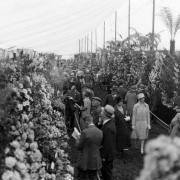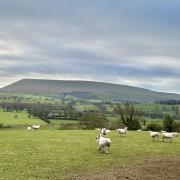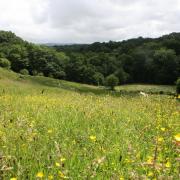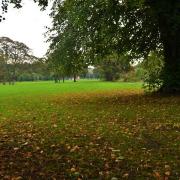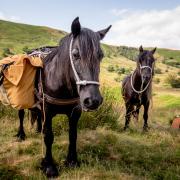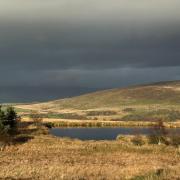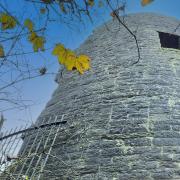Gordon Wilkinson took his watercolours to a Lancashire coastal village where traditional industry and leisure activities rub shoulders. Words: Roger Borrell
AT first glance, Glasson Dock looks like a place with a long and proud industrial past but a future which will struggle without tourism and leisure. However, scratch the surface and you will find a hive of industry.
The cranes captured in Gordon Wilkinson's painting are a give away, revealing there's more to this characterful coastal village than cycle tracks and bird-watching. Delve a little deeper and you discover that the 280 residents of Glasson - many retired from Lancashire's urban hinterland - are outnumbered by the people who go to work there.
There will have been settlements in the Glasson area since the days when early man found ways of eking a living from the coastline. Its history is inextricably linked to the sea, but then, so is its future.
Real development didn't start until the 1780s when a dock opened to accommodate large vessels no longer able to navigate the fast-silting Lune. Much of the trade which made Lancaster a boom port, particularly from the West Indies, gradually transferred down river.
A major boost came in the 1820s when a branch of the Lancaster Canal arrived in Glasson, allowing goods from the docks to be transported more quickly and efficiently. Its fortunes were further enhanced a decade later when the Nicholson family started building ships there and the arrival of the railway in 1883 meant everything was set fair for Glasson.
One of the most famous vessels built there was the schooner Ryelands, launched in 1887. It eventually became a film star, cast as The Hispaniola in the 1950s classic Treasure Island. It ended its days renamed the Moby Dick and used as a tourist attraction at Morecambe before fire destroyed it.
Like all small ports, Glasson went through a long, gradual and unremitting period of decline. But today two companies which sit side by side in West Quay epitomise the belief that there is still plenty of life in this fascinating little community.
The Port of Lancaster Smokehouse is synonymous with Glasson. Under the inspired guidance of Michael Price, aided by parents John and Pat and a passionate backroom team, this business has blossomed into one of Lancashire's food heroes, scooping award after award and receiving accolades from Britain's top chefs.
If you can't find them, simply follow your nose. The wonderful aroma of kippers being smoked in oak and beech is more intoxicating than anything sampled by a Government minister in student days. Apart from kippers, you'll find an extraordinary range of delicacies for sale in the smokehouse shop - wild smoked salmon, smoked cod roe, smoked cheese from Mrs Kirkham's, smoked ham. You name it, they smoke it - even black puddings.
'We feel very lucky to be here,' says Michael's assistant Paul Doyle, a Glasson lad whose mum still lives in the village. 'We source everything we can locally. We are as aware as anyone when it comes to carbon footprints and food miles.
'I went to university and worked in London for a while but when you've been brought up in quiet place like Glasson you always want to come back and, luckily, I was able to do that. Being in London wasn't for me - it was like living in a giant ant-hill.' John Price is also part of Glasson's fabric. He was a parish councillor for 30 years and he was a port commissioner for 20. 'The place did go down-hill at one stage and it was suggested that we simply give up the ghost by opening the dock gates and letting it silt up. But we didn't and, gradually, the trade has built up again.'
Next door to the smokehouse is Glasson Grain, a mainstay of this not-for-profit trust port. This company, with a staff of 47, is a major player in the import, export and manufacture of animal feed and fertiliser. There's also a service up to three times a week for the Isle of Man and recycling has become another important source of trade with broken bottles and scrap metal being shipped out to Portugal, Spain and Germany.
'Glasson is still thriving because the people here make it thrive,'
said David Chadwick, managing director of Glasson Grain, now part of Welsh-based Wynnstay plc. 'We trade 300,000 tonnes of animal feed a year and we also manufacture fertiliser at a plant in Winmarleigh so we have a significant impact on the local economy. This is a very small village but it has some big companies.'
Operations director and harbourmaster Rowland Casson, has lived in Glasson for all his 59 years and he's the fourth generation to come from the village. 'If I was on the streets as a youngster I knew the names of everyone I met and where they lived. But that's not the case any more because we have had so many incomers.
'During the 60s the place was moribund. Dying on its feet. Several companies came and went but Glasson Grain is the one that came and stayed and I remain optimistic about the future of the place.'
Rowland is also one of the river pilots. 'This a very tidal port - the channel can change by half a mile in just a month and we have to carry out a survey once a week.
It's quite a treacherous stretch of coastline.' David added: 'That's underlined by the fact that the road into the village floods quite regularly.'
It's also echoed in the atmospheric, tiny Christ Church. It was consecrated in 1840 and the simplicity of the inside is contrasted by the wonderful east window, a strikingly modern vision of Christ with a lighthouse, oystercatchers, sheaves of corn, stork and fish.
Outside, the canal-side graveyard is another reminder of the perils of the sea. One memorial, erected by public subscription in 1895, commemorates local heroine Bessie Marsh, who was just 18 when she drowned trying to save eight-year-old James Bownass.
While Glasson sustains an industrial core, it is becoming more dependent on leisure and tourism and this has been recognised by British Waterways, which has taken over the marina. This attractive pool is already home to many impressive looking yachts and the expectations are high that there will be further development in the near future.
That's good news for the two village centre pubs, The Victoria Inn and the Dalton Arms, the nearby Stork and the wonderfully-named Lantern O'er the Lune cafe, a favourite with hikers and middle-aged bikers.
If you are looking for a 'shopping experience' look elsewhere. Glasson exists pretty much through its one sub post-office, which sells everything from shoelaces to tinned peas. Like all post offices, its survival is currently in the hands of some faceless bureaucrat.
They need only spend five minutes beside the counter to realise that closing it would tear the heart from this unique village.





